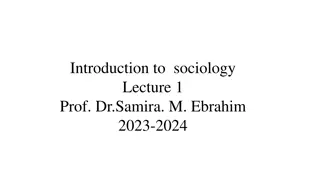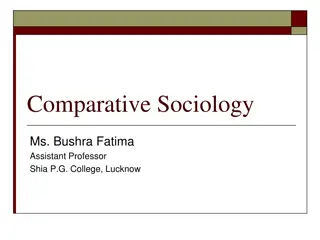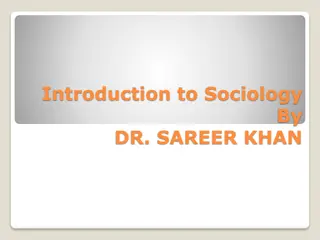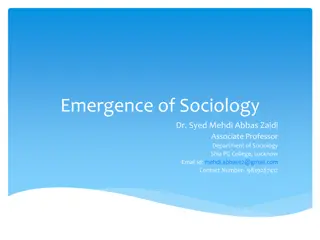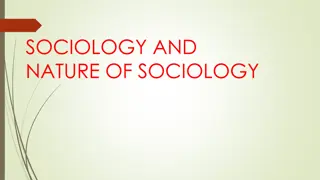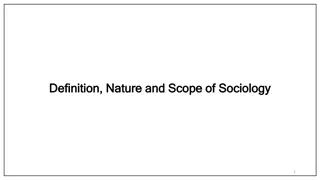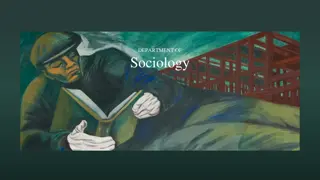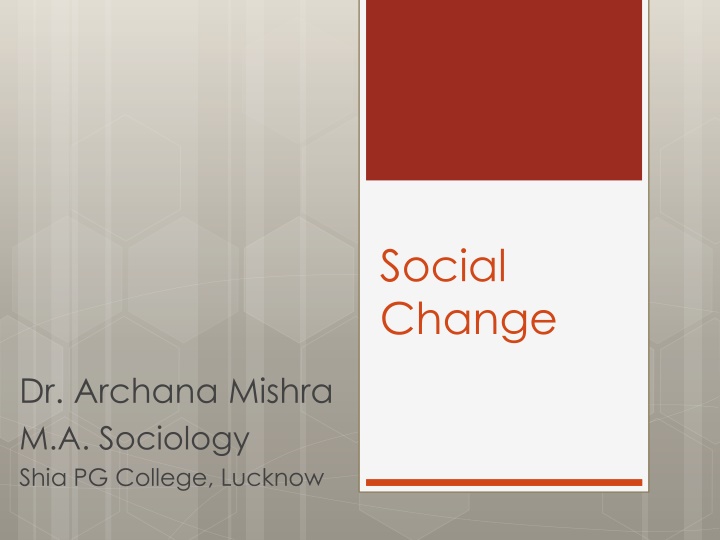
Social Change: Definition, Characteristics, and Processes
Explore the concept of social change, its definition, characteristics, and processes. Social change refers to transformations in social organization, relationships, and institutions that impact society over time. Discover factors influencing social change and how it varies across different societies.
Download Presentation

Please find below an Image/Link to download the presentation.
The content on the website is provided AS IS for your information and personal use only. It may not be sold, licensed, or shared on other websites without obtaining consent from the author. If you encounter any issues during the download, it is possible that the publisher has removed the file from their server.
You are allowed to download the files provided on this website for personal or commercial use, subject to the condition that they are used lawfully. All files are the property of their respective owners.
The content on the website is provided AS IS for your information and personal use only. It may not be sold, licensed, or shared on other websites without obtaining consent from the author.
E N D
Presentation Transcript
Social Change Dr. Archana Mishra M.A. Sociology Shia PG College, Lucknow
What is Social Change social interactions and relationships that transform cultural and These changes occur over time and often have profound and long-term consequences for society. The social change is also known as social progress or socio cultural evolution. A significant social change occurred in the form of drastic shift from an agricultural society to industrialized and post modern society. change is a changes in human social institutions.
Concept of Change Change is the difference arising in any object, or idea from the interval of time. It is a specific concept that is found in all three worlds, i.e., biological, physical and social. It is a universal process of differentiation, which occurs in time space.
Definition of social Change Social change is change in social organization, social relations, institutions and change occurring in different units of society. Ginsberg, Social change structure . M.D.Jenson, Social change as modification in ways of doing and thinking of people . Jones , Social change is a term used to describe variation in or modification of any aspect of social process, social patterns, social interactions or social organization . Gillin and Gillin , Social changes are variations from the accepted mode of life, whether due to alteration in geographical condition, in cultural equipment is a change in social
Characteristics of social Change Social change is universal process. This is an abstract concept. Social Change is not Uniform Social Change differs from society to society it can be progressive or regressive, positive or temporary, planned or unplanned, unidirectional or multidirectional, beneficial or harmful. It can be linear, multi-linear and cyclic form. Change is unpredictable in general. What speed and in what form the change takes place is not easily predictable. Social Change is change in community This is a neutral and complex concept negative, permanent or
Processes of Social Change Evolution Progress Adaptation Development Revolution Social Movement
Factors of Social Change Natural earthquakes, draughts, famines and other natural disasters always force changes. Cultural Factors: It depends upon belief, ideas, values, customs, conventions and institutions etc. When there is a change in these, it influences the social life. Science and Technological Factors: Two main sources Factors: Natural calamities like floods, 1. 2. 3. 1. Invention 2. Discovery Invention and discovery in technology can produce a large scale change in society.
Factors of social change 4. Biological Factors: Biological factors are those factors which determine the structure, selection and hereditary qualities of generations. 5. Demographic Factors: Demographic factors like population, birth rate and death rate etc. The population increase or decrease always bring social change. 6. Socio-economic Factors: Social structure of a country is determined by economic factors and it is responsible for change 7.Political Factors-Political leadership and individuals in power influences the rate and direction of social change. 8.Psyshological Factors-Social personal change, which leads to commitment and motivation. It includes social support, social status, social integration, loneliness and social integration etc. change begins with the
Social Change in India Westernization Sanskritization Modernization Democratization Globalization Secularization Universalization Industrialization Urbanization
Types of Social Change Linear/Evolutationary Pattern-It moves in the form of a line. Development technological field is an example of this. August Comte, Karl Marks, Spencer, Morgan , Taylor etc. are its supporters. Fluctuating Change-Changes in the upward or downward direction of change. This change sometimes happens in the form decadence, its main supporters are Sorokin. Cyclical Change-the change in it repeats itself in the form of a cycle. This change is seen in the field of fashion etc. Its supporters are Toynbee, Pareto, Spengler etc. 1. in scientific or 2. 3.
Reference Madan, G.R., Sociology of Change and Development Singh, J.P., Social Change in Modern India


